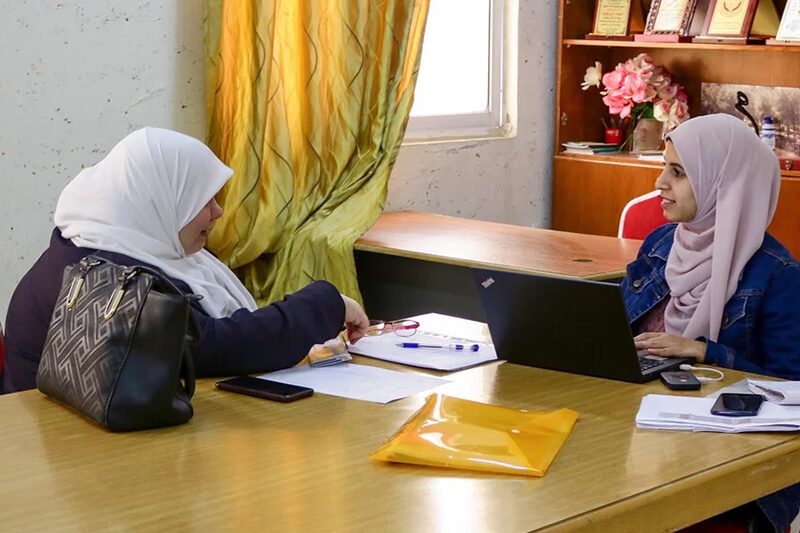A first-of-its-kind study examines the social networks of women from low-income households, including Syrian refugees, in Amman, Jordan.
Providing poor women, including Syrian refugees, in Amman, Jordan, with volunteer opportunities helps them diversify their social networks, enhances their sense of empowerment and wellbeing, and potentially encourages social change, according to a new study coauthored by Yale anthropologist Catherine Panter-Brick.
The study, published in the journal World Development, is the first to assess the social networks of women from low-income households in Syrian refugee- and host communities in Jordan, and how those social ties influence women’s perceptions of themselves and their place in society.
In a survey of 215 women — 106 Syrian refugees and 109 Jordanians — from poor households across five neighborhoods in Amman, the researchers found that having a larger social network was associated with a greater sense of empowerment, personal satisfaction, and social support. The study also showed that these positive associations decreased the more their social networks were confined to family. Women who performed volunteer work in their communities had more diverse networks and reported higher levels of resourcefulness and psychological wellbeing, the researchers found.
“Volunteering helps women in these communities to work, learn, and socially interact with others, diversifying their social networks, and improving their sense of empowerment and wellbeing,” said Panter-Brick, the Bruce A. and Davi-Ellen Chabner Professor of Anthropology, Health, and Global Affairs at the Jackson School of Global Affairs and in the Department of Anthropology in Yale’s Faculty of Arts and Sciences, and the study’s senior author. “Our findings suggest that increasing volunteer opportunities is one way to help women take on leadership roles within their communities and plant seeds for social change.”
Syrian refugees and Jordanians live side-by-side in Amman’s poorest neighborhoods, where residents’ social networks are crucial to maximizing resources and socioeconomic advancement, the researchers noted. However, there is limited data on how women within refugee and host communities structure their social ties or how social networks affect women’s sense of empowerment and wellbeing. A better understanding of how social networks affect social activities, work, and other opportunities can offer insights that could potentially help policymakers, the United Nations, and non-governmental agencies fine-tune development programs to assist refugees and the urban poor, they explained.
In the survey, conducted in 2022, the researchers assessed the structure and composition of the social networks of these women and tested for several measures of psychological empowerment and wellbeing. They also conducted participatory network mapping — an exercise that allows individuals to visually convey the size and structure of their social networks — with a randomly selected subset of survey respondents from both groups. The mapping revealed insights into the participants’ lived experiences, local understandings of empowerment, and the links women perceive between their social ties and social situations.
The results showed that the women’s networks were highly homogenous and largely composed of their kin. On average, Syrian women’s networks were 89% Syrian and those of Jordanian women were 95% Jordanian. Relatives accounted for three-quarters of respondents’ close peers. Networks were smaller for Syrians than Jordanians; and were smaller for women in very poor households. Women with larger networks reported higher levels of psychological empowerment, motivation to lead, and perceived social support, according to the study.
About 37% of respondents had worked as community volunteers, helping to feed the poor, clean streets or mosques, or providing education and social services. Women with volunteer experience had more diverse networks and reported higher levels of resourcefulness and psychological wellbeing. The participatory network mapping indicated that women described empowerment as ‘‘ability” and ‘‘proof of existence,” and further drew upon volunteering work to diversify their networks outside the home, the researchers said.
“This is a very important paper in that it vividly demonstrates the predictive power of social capital — a factor readily addressed by social policy — on crucial outcomes in Amman and other displacement-affected settings,” said Alastair Ager, director of the Institute for Global Health and Development at Queen Margaret University, Edinburgh, who was not involved in the study.
The Kingdom of Jordan has made women’s social and economic empowerment a national priority, Panter-Brick said. But given the conservative nature of many Syrian and Jordanian communities, women are expected to work within the home, rather than take up opportunities in the community. Women in the study reported that their social interactions are often tightly regulated by male relatives. So being empowered meant being able to maintain strength or self-confidence, and a sense of being “in the right place” through one’s life experiences, she explained.
“Increasing volunteer opportunities for Syrian refugee and Jordanian women to serve their communities could be a small but feasible first step toward opening genuine pathways to diversifying and enriching life experiences,” said Panter-Brick, who directs the Program on Conflict, Resilience and Health at Yale’s MacMillan Center for International and Area Studies. “We are now testing this proposition in a randomized controlled trial in a follow-up study, something we can do because of pre-existing, long-term, in-country partnerships.
“The success of this next study rests in being able to understand the lived experiences of women, document their networks, and map their social worlds, with a view to social change.”
Data collection for the study was supported by funding from the Program on Refugees, Humanitarian Responses, and Forced Displacement and the Program on Conflict, Resilience, and Health at the MacMillan Center.
